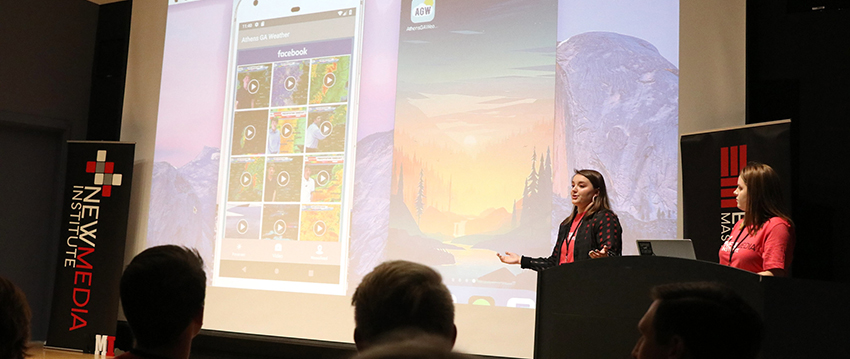New Media Institute publishes native apps from capstone class

New Media Institute publishes native apps from capstone class
A new bar has been set by the New Media Institute capstone teams with the acceptance and publication of four new native apps in the Apple App Store.
The mobile apps created by the spring 2019 cohort of the NMI are now available for complimentary download in the App Store. The four new apps include:
-
- Athens Georgia Weather — a partnership with University of Georgia Geography Department that highlights local Athens weather forecasts and videos. Available in Android, too.
-
- Hunter-Holmes AR Experience — an augmented reality app that transports the viewer back to 1961 through original video, audio and photographs as Hamilton Holmes and Charlayne Hunter-Gault integrated the University of Georgia.
-
-
- Peabody Awards — a listing of award winners since 2015 and videos of interviews with winners, special Peabody spotlight features and awards ceremonies.
- UGArden Herbs — a resource to track and view data about herbs grown through the student-operated UGArden to assist in the organic certification process. Available only on the iPad.
-
“It’s really cool to see in five years the progress our students have made from producing proto-type apps, to a point today where we are regularly releasing apps on behalf of our clients,” said John Weatherford, a lecturer in the New Media Institute.
Students who work toward their certificate in New Media are required to finish with the capstone course, where they work in teams with a client to solve a technology challenge. While all the teams work on websites, apps or social media campaigns, only a handful are developed to the point that they are published.
Not all the teams have the time above and beyond classroom requirements to publish an app. The teams have to be willing to put the effort into apps to be eligible for publication in the App Store, including having everything up to code quality, preparing marketing write-ups, screen shots and documentation.

“There is a level of polish required to submit to one of the largest software markets in the world,” Weatherford said.
Having a tangible project that students can show future employers is only one benefit.
“Having marketable skills and being able to leverage their degree is a huge advantage,” Weatherford continued.
For the apps that are published, students need to also focus on documenting the site and preparing it to hand over to clients. Several students continue working with their clients after the projects to develop future content, as well.
NMI instructors Chris Gerlach and Emuel Aldridge help with mentoring and guiding the students in submitting their apps for publication and understanding marketplace.
Over the past several years, Weatherford said that the introduction of Apple’s programming language called Swift made the programming syntax used in developing apps easier to use. It was about that time that NMI started offering a course specializing in native apps.
“That course was very marketable and attracted a variety of different majors including computer science students,” Weatherford said. “This gave us a deeper bench to have a diversity of students with different majors.”
Weatherford also cites the interest in augmented reality for an increase in the native apps.
One of the most popular apps was the first one that NMI published called UGA Stickers. This app features digital stickers with UGA athletics icons and messages that people attach to their text messages. Regular updates are published, and more than 20,000 installs of the app have occurred to date.
Several other apps, including one for Grady Newsource, are expected to be published in the next few months.
Interest in the NMI certificate continues to grow and the Spring 2019 capstone course featured 84 graduating seniors working with 15 clients.